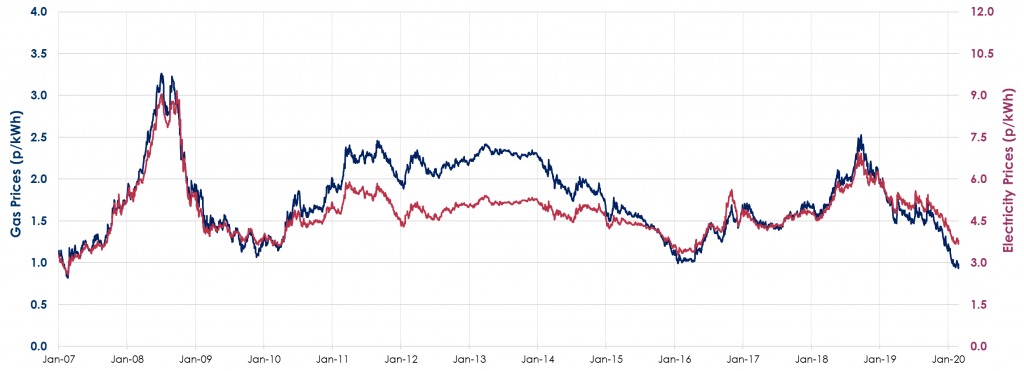UK gas and power prices posted strong losses during February. Gas prices fell 15.9% to a 13-year low at 0.97 p/kWh in response to strong weak global demand exacerbated by coronavirus fears, combined with plentiful LNG deliveries, high gas storage, strong pipeline supply and no major outages. Gas stockpiles in Europe are still around 60% of full capacity, compared to just 42% at the same point in 2019, meaning that less storage capacity needs to be refilled during the upcoming summer gas injection season.
Power also fell last month, losing 11.7% to 3.75 p/kWh in response to weaker gas, carbon and European energy prices.
Brent crude oil prices recorded its biggest February decline in 30 years, sliding 20.9% to $52.189/bbl, as a growing number of coronavirus cases worldwide hit forecasts for global economic and energy demand. Carbon lost 3.9% to €23.56/tCO2 as the UK is set to commence auctions for its 2019 and 2020 allowances in the first week of March, following a year-long suspension on distributing its carbon permits were being lifted.
European coal prices remain close to multi-year lows on concerns the coronavirus will further erode global demand and amid low gas prices.
Coronavirus concerns and comfortable gas supply has resulted in UK gas and power prices falling to record low levels. However, global energy prices are unable to fall much further. Combined with post-Brexit uncertainty energy prices for the next 2-3 months should be favourable for multi-year contracts.
It is unclear when coronavirus concerns will come to an end, but the unpredictable nature of energy markets closer to winter means businesses should start their energy renewals now, and consider locking in longer-term gas and power contracts by the end of June.

Brexit: Post-Brexit trade talks between Britain and the European Union are formally scheduled to begin in Brussels on 2nd March. Both sides have published their negotiating mandates. Unfortunately, though they share the goal of a free-trade agreement (FTA) like the EU’s with Canada, with no tariffs and no quotas. However, opinion over how to achieve this is divided. PM Boris Johnson’s government insists it will not extend the transition period (during which pre-Brexit arrangements continue) beyond 31st December 2020, meaning there is little time left to resolve differences.
Coronavirus: Around 82,000 people have been infected with the coronavirus, with the total number of confirmed UK cases reaching 35. Britain’s Secretary of State for Health Matt Hancock has said an emergency “battle plan”, drawn up for the “worst case scenario”, includes banning big events, closing schools and dissuading people from using public transport.
UK economy: Bank of England governor Mark Carney warned coronavirus could hit the UK economy in the months ahead, raising expectations of an interest-rate cut and increasing the chances of a difficult economic forecast for the chancellor in the upcoming Budget, scheduled for 11 March.
Heathrow third runway ruled illegal: The UK government will not appeal against a court ruling that Heathrow airport’s £14bn project to build a third runway was unlawful on environmental grounds. The Court of Appeal found the government had failed to consider commitments made under the 2016 Paris agreement on climate change. It ruled that this made the government’s airports policy unlawful.
Drax to stop coal generaiton by 2021: Drax power station will stop burning coal for power-generation at the end of March 2021. It means Drax will stop using coal well ahead of the government’s 2025 deadline, making an even bigger contribution to the UK’s efforts to achieve net zero.
Disclaimer: These views and recommendations are offered for your consideration and Beond makes every effort to ensure that the data and information in this report is accurate. However, due to the volatile and unpredictable nature of the energy markets, Beond cannot guarantee the accuracy of both the information and the recommendations provided. Beond does not accept any responsibility for errors or misstatements, or for any direct, indirect, consequential or other loss arising from any use of this information and/or further communication in relation to this information.